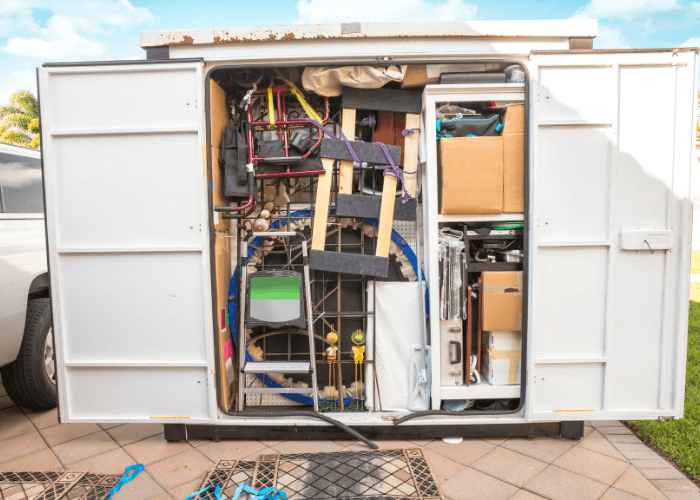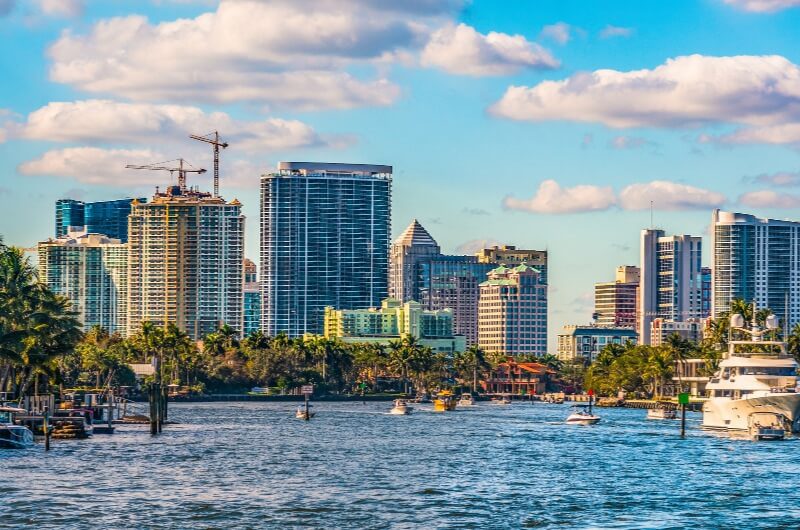There are many uses of moving containers (popularly called POD) during a move, renovation, or travel. But did you know that there are certain limitations on what you can and can’t store inside a pod?
To protect your household goods, and your storage facility workers, and the facility itself, there are certain items prohibited from storage.
While you can easily predict some restricted and prohibited items, others are not so clear.
If you are not sure of a certain item, it is always best to speak with your storage facility provider and confirm with them first.
To provide you a clear idea of the items that are not allowed in your storage container, we’ve given a basic list of important items, including plants, perishable goods, and hazardous materials that a lot of moving companies will not transport (or even will not pack).
Here is a quick list of things you should not store inside a self-storage unit or a storage container.
Hazardous Materials
The moving companies and moving container companies will not transport hazardous materials. So before you move, you should first get rid of these items quickly. Fortunately, you can easily replace a lot of hazardous items.
Don’t forget: hazardous materials always have “hazardous” written on them for a reason. They are materials that completely contain chemicals that are so much combustible and/or possibly explosive.
Hazardous items are:
- Acids
- Charcoal lighter fluid
- Fire extinguisher
- Fertilizer
- Paints
- Paint thinner
- Aerosols
- Cleaning solvents
- Propane tanks
- Poisons
- Motor oil
- Charcoal
- Pool chemicals
- Nail polish remover
- Ammonia
- Matches
- Scuba tanks
- Pesticides
- Batteries
- Gasoline
- Loaded guns
In all you do, don’t dispose of hazardous materials in the trash. Doing so could cause the removal company and the public danger.
To dispose of these chemicals properly before you load a moving container, check your nearest hazardous waste facility drop-off center.
These drop-off centers will have enough, neatly labeled bins to quickly and easily dispose of them.
Valuable Items
Your moving container provider may have some policies concerning valuable and sentimental belongings. If you are moving these items, the best thing to do may be to keep them close to you in a separate box all through the moving process.
Even though moving containers are considered a safe and secure alternative for shipping your household items, there is still a possibility that something could break or turn damaged while in the process.
After all, accidents are inevitable. This is why it is so important to stay away from placing valuable and irreplaceable belongings inside the moving container.
You should take the following valuable items with you (not in the pod):
- Credit cards
- Medicine
- Financial documents
- Money
- Jewelry
- Furs
- Firearms
- Computer software or programs
- Sentimental items
- Family heirlooms
- Electronics
- Medical and dental records
- Photo albums
- Car titles
- Cell phones
- School records
- Laptops
- Collections
- Keys
- Checkbooks
If you choose to pack valuable items inside your moving container, make sure you read the liability options of the company first.
For instance, PODS customers must possess coverage for their container and its content.
The moving container company offers two different liability coverage which includes: Protection Option and the Container Only Option.
While these options give some level of protection, they will possibly not give full compensation for damaged or lost items. Also, some valuable items are normally not added from these liability options.
Perishable Food
Packing perishable food (or any packaged food) into your moving container is not a nice idea. This could attract some unwanted guests (like bugs or rats), as well as causing you a lot of spoiled fare at the end of your relocation.
So before you move, I strongly recommend you dispose of or donate opened or perishable food items.
If you plan to move unopened pantry items, you should be able to get this done in a moving container.
Non-perishable includes soups, unopened sauces, canned goods, and pasta. If you choose to leave your canned corn and pasta before you move, consider donating them to the nearest, local food bank.
After all, it would be a major shame to have that food goes to waste.
Perishable items below are not to be packed inside your moving container:
- Milk
- Butter
- Yogurts
- Ice cream
- Frozen treats
- Fresh produce
- Refrigerated food
- Opened pantry items
- Opened beverages
Radioactive Materials
These are so dangerous because you may not be aware that you are already exposed to them. Do not store radioactive materials in self-storage containers, as these storage centers often do not have what it takes to protect employees within close distance to a radioactive item.
Plants
There is a possibility that your moving container provider will not load indoor or outdoor plants in the container, especially if you are making a long-distance move where you are crossing state borders.
This is because a lot of states have some laws in place about the kind of plants that can and can’t be imported. This is aimed at preventing the spread of harmful insects, pests, disease, and invasive plants.
Yes, plants need sunshine to survive as well, so the best you can do is to carry them with you when you move.
Before you pack your plants, be sure to check your State Plant Regulatory Official in advance.
Anything Seasonal
The good thing about PODS is that you can’t just enter and pick up an item that you already packed up as you do with a traditional storage unit. Your belongings are in there until you arrange for return delivery and each trip will cost you extra money.
Even if you think by Halloween you will already be in your home, just proceed and assume it will happen after Christmas just in case, so, you are safe from buying fake decors.
Anything Breakable
I understand, but until you see how PODS unloading performed in your driveway, you don’t appreciate the importance of loading the PODS.
According to a customer, he ordered over-sized PODS and began to pack it carefully and tightly towards the door.
After packing for two days, he discovered that it will not be nearly full enough and when the driver arrived to pick it up, all the contents would shift and fall apart, regardless of the amount of care they used in lifting it.
It is recommended that you pack the bottom of the PODS first, and then proceed to pack upward and leave the crystal on your table.
Guns and Weaponry
Even though it might seem like the items would be safe in a self-storage container, guns are prohibited from being stored in storage facilities. Accidents can occur, and they may go off accidentally and cause an explosion.
Looking To Store With Pods?
If you are looking to store your belongings in a PODS storage container, together with the above you must not store any illegal, stolen, explosive, inflammable, environmentally harmful or items that pose risk to the property of any individual or group.
Also, avoid storing irreplaceable items like furs, currency, curios, deeds, paintings, jewelry, or works of art and any items that have sentimental value to you is very much important.
Final Words
For further information on portable moving containers, get free quotes from moving container companies nearest to you on Adams Van Lines. Just supply the location you are moving from, the address of your new home, the size of the bedrooms in your new home, and the date you desire to complete your move.
We will provide you with the best available quote, and allow you to compare other shipping container movers as well.






